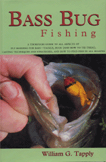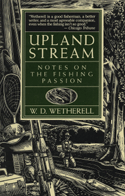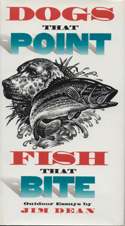|
Fly fishing and fly
tying books are a passion. Here you will find book reviews of books I have
read covering fly fishing for trout, smallmouth bass, muskellunge,
steelhead, and many other freshwater and saltwater species. You will also
find fly tying books covering the same areas. There are also books on
aquatic entomology, history of fly fishing and fly tying, hydrology, and
great prose having fly fishing as its main theme. There is far more to fly
fishing than casting a line, and there should be far more to a fly fishing
guide service web site than just costs and services offered.

Bass
Bug Fishing
by William G. Tapply
The Lyons Press
New York, NY 1999
142 pages, hardbound
illustrated, color and B&W
suggested price $25.00
reviewed by Bruce E. Harang
This small volume is a
general overview of the bass bug fly-fishing. It contains sections on the
history of bass bug fly-fishing, how bass bugs work, fly-fishing for
top-water bass, fly-fishing gear needed, tactics for fly-fishing bass bugs,
tying bass bugs, a collection of bass bug fly patterns, and a bass bug
fly-fishing bibliography.
Most of the book’s contents are a compilation of what others
have recorded in the books listed in the bibliography. There is very, very
little new material here. There certainly is nothing innovative to be found.
If you are completely new to bass bug fishing this book will certainly put
you on the correct path and furnish you with the tools necessary to be
successful. If you are already, a bass bug fly fisherman you will not find
anything new to add to your arsenal.
The four color plates shot by Dick Talleur are wonderfully done.
The rest of the illustrations are in black and white, by the author, and
they are of very poor quality. The quality of the black and white
illustrations is so bad that they should never have been allowed by the
editor. The writing is very good. Unfortunately, the author has very little
to say that hasn’t already been well said by others.
Overall, the highpoint of the book is the bibliography. If you
are new to bass bug fly-fishing this book is worth checking out of your
local library.
©
2000 Bruce E. Harang

Carrie
Stevens
By Graydon R. Hilyard and Leslie K. Hilyard
Stackpole Books
Mechanicsburg, PA 2000
162 pages, hardbound
illustrated, Color and B&W
suggested price $39.95
reviewed by Bruce E. Harang
There are certain
objects, which evoke strong associations with a particular human endeavor.
In the sport of fly-fishing the Gray Ghost streamer is one of these. In the
English-speaking world, it is unlikely anyone who fly-fishes has not heard
of the Gray Ghost. Most fly-fishermen even will know that it was created by
a woman commercial fly tyer Carrie Stevens. Beyond these bare bone facts
however, few know anything more about the person whose innovations brought
feather wing streamers to the apex of their development and popularity. This
book, by Hilyards father and son, does a great service by bringing to light
a large volume of information, facts, and interesting stories about Carrie
Stevens and the feather wing streamer style she was so pivotal in
developing.
The book contains an excellent history of Carrie Stevens as a
person, a fisherman, and a commercial fly tyer. The reader learns how Mrs.
Steven got started in fly tying and why she tied feather wing streamers. You
will also find out why coming in second in a national fishing contest was
the event that catapulted her career into national and worldwide prominence.
Equally interesting and well done is the history of the Rangeley Lakes
region and the landlocked salmon and brook trout fishery there that provided
the impetus for the development of trolling streamers and particularly the
feather wing streamer design. All of this is done with good grammar, good
editing, and first class illustration.
The photographs of Carrie Stevens streamer patterns are
excellent and a welcome resource to every fly tyer and fly fisherman
interested in streamers and streamer fishing. A style of fly and method of
fly-fishing that are uniquely American. There are twelve color plates
depicting ninety three patterns. There is also a catalog of Carrie Streamer
related patterns comprising nineteen patterns inspired by Carrie Stevens and
the wonderful feather wing streamers she so ably developed. Finally, the
photographs and illustrations of Carrie Stevens, her family, her friends,
and the places she is best connected with are a wonderful family-style album
of one of fly fishing’s brightest stars.
Overall, a wonderful volume covering one of the most
historically significant members of the American history of fly-fishing. A
book every fly tyer and fly fisherman should have in his library.
©
2000 Bruce E. Harang

Modern Streamers for Trophy
Trout
by Bob Linsenman & Kelly Galloup
The Countryman Press
Woodstock, VT 1999
160 pages, hardbound
illustrated, B&W and Color
suggested price $34.95
reviewed by Bruce E. Harang
The authors are two of
the best fly fishing guides in the state of Michigan. That is saying a lot
in a state where fly fishing guides have been creating legends for over a
century. What the authors have done, in this book, is provide the
fly-fishing public with a working handbook for catching the largest trout in
a stream on streamers. The methods and fly patterns have been developed
during years of pursuing and catching the largest trout on some of
Michigan’s, and fly-fishing’s, most famous, and difficult, waters.
This is not pabulum from some big name selling yet another poor
quality book based on nothing more than a desire to make money. This is a
work based on years of experimentation and time on the water. This book gets
straight to the matter at hand, in workmanlike fashion, providing the fly
fisherman with the tools he requires to be successful at catching very large
trout. Broken into six chapters the book provides the reader with a logical
progression from beginnings of streamer fly-fishing to effective fly
patterns and equipment. In-between, the reader is given instruction on the
behavior of large trout, how to read the water to locate large trout, and a
solid course in the techniques of fishing the streamer to attract the
attention of large trout.
The patterns advocated by the authors are all illustrated in two
color plates and the complete recipes for each pattern are also included.
The line drawings of casting techniques, and river structure and how it
relates to large trout, are excellent. The black and white photographs are
well composed and excellently reproduced. They maintain their clarity and
sharpness showing great attention to detail by both photographer and
printer. The writing style is straightforward. The grammar is excellent and
the editing is top notch, making this an easily read book. Overall, the
authors and the publishers have every right to be very proud of this work.
This work should be on every trout fisherman’s bookshelf right next to the
classic Streamer Fly Tying and Fishing, by Joseph Bates, Jr.
©
2000 Bruce E. Harang

Virginia Blue-Ribbon Streams
A Fly-Fishing Guide
by Harry W. Murray
Frank Amato Publications, Inc.
Portland, OR, 2000
96 pages, softbound
illustrated, color
suggested price $$24.95
reviewed by Bruce E. Harang
Overall, I don’t like
where-to-fish guidebooks. Most of them are poorly researched, poorly
written, and generally useless. This volume, however, proves the exception
to the rule. This is a book you will enjoy reading as well as one that will
inform the visitor to Virginia about the best fly-fishing opportunities. The
text is well written and well edited. The color reproductions are very well
done and pleasing to look at. In addition, they compliment the text very
well. This is another indication of good editing.
The major reason I like this book is that it not only covers the
best trout streams, it also covers the best Smallmouth Bass streams in
Virginia. Moreover, as Virginia has some of the finest Smallmouth Bass
stream fishing in the world this volume is a real boon to the warmwater fly
fisherman. Since the streams holding the best Smallmouth Bass populations
tend to be rather large, the best way to fish them is to float sections of
the stream. Here the author has done a wonderful job of giving the angler
the necessary information to allow him to choose a float that meets his time
constraints. It also provides detailed instructions on put-ins and take-outs
and the significant obstacles in-between. These instructions are aided by
enlarged inset diagrams of the actual take-out and put-in sites.
The best part of the trout stream portion of the book is the
information for fishing these smaller streams during the whole year
including the winter months when fishing is still good but large numbers of
people are not present.
Each stream description includes up-to-date information on
lodging; fly shops, information centers, canoe rentals, campgrounds and
more. Finally, each stream has several photographs of it to give the reader
an idea of the type of water and shoreline he will encounter.
Overall, the best of the “where to go” books out and well worth
the cost.
©
2000 Bruce E. Harang

Spey Flies & Dee Flies
Their History & Construction
by John Shewey
Frank Amato Publications, Inc.
Portland, OR, 2002
160 pages, softbound
illustrated, color
suggested price $$29.95
reviewed by Bruce E. Harang
Interestingly, Spey flies and Dee flies are two of very few styles of
fishing flies that are named after the rivers where they were born. Just as
interesting is the fact that how to tie these productive styles of flies,
even now over a century later, is practically unknown. Considering their
having been recorded as extremely productive flies for Atlantic salmon over
a century ago and within the last half century as also productive for
Steelhead, it is remarkable that so little is known about them and the tying
methods for producing them.
John Shewey has taken an important major step in rectifying this
situation with the publication of his book on the subject. John is probably
best known worldwide for his impeccable selection and dyeing of fur and
feather for the classic Atlantic salmon fly tyer. He is also very well known
in his home region of the Pacific Northwest as a master fly tier, especially
of Steelhead flies. Now John shares his years of experience by clearly and
concisely explaining the history of these wonderful flies, material
selection and preparation, tying techniques and strategies, as well as how
to most effectively fish these styles of flies.
Frank Amato Publications has once again produced a fine quality
book. The book is well laid out and edited which enhances the clear, crisp
writing style of the author, making the book a real pleasure to read. In
addition, the photo reproductions are crisp, sharp, and have good color
saturation and hue. The only disappointment I had with the production of the
book is that the images used to show how to reverse thread on the hook
shank. The fine black thread used does not show up and leaves the reader
completely at a loss as to what these photos are trying to show. Line
drawings or oversized white or brightly colored thread or wire would have
made the visual explanation so much more clear.
This is definitely a top quality publication at every level. A
book that every serious fly tyer wanting to tie productive flies for
Atlantic salmon and Steelhead needs to add to his library.
©
2002 Bruce E. Harang

The Hatches Made Simple
by Charles R. Meck
The Countryman Press
Woodstock, VT, 2002
261 pages, hardbound
illustrated, color and B&W
suggested price $35.00
reviewed by Bruce E. Harang
Charles R. Meck has written a number
of books on fly fishing. This latest effort is no better than the previous
attempts and worse in that there is very little worth struggling through the
book to find. The book title suggests that the fly fisherman can simplify
his fly selection. However, the simplified system put forth by the author
requires over three hundred flies if the fisherman is only carrying one of
each pattern and size.
The physical layout of the book clearly was never planned. There
is no continuity and the reader is forever required to look somewhere else
in the book for the completion of the current subject. The material is all
available elsewhere, nothing new or innovative is offered. Thus, the book is
extremely difficult to read and provides nothing for the reader’s
edification in the end.
The Countryman Press has done a great job as usual of physically
producing the book. However, the editor of this manuscript should clearly be
taken out behind the woodshed and soundly thrashed.
©
2002 Bruce E. Harang
 Upland
Stream Upland
Stream
by W. D. Wetherell
Little, Brown & Company
Boston, MA, 1991
204 pages, softbound
not illustrated
suggested price $9.95
reviewed by Bruce E. Harang
On my current reading list - review will be forthcoming very soon
 Dogs
That Point, Fish That Bite Dogs
That Point, Fish That Bite
by Jim Dean
The University of North Carolina Press
Chapel Hill, NC, 1995
154 pages, hardbound
not illustrated
suggested price, $24.95 and
$10.95
reviewed by Bruce E. Harang
Jim Dean
grew up in the North Carolina
outdoors. For over twenty years now he has written about his hunting and
fishing excursions. This book is a collection of short stories that have
appeared in the award winning magazine North Carolina Outdoors.
The author writes with a wonderful sense of southern humor and
insight that is rare in today’s world of “how-to” tomes in the
hook-and-bullet press. The joke is usually on the author, but the humor is
shared by everyone who has been in the field or on the stream. He also
writes with a style that is a pleasure to read. Jim clearly is a master at
using the English language. He extracts the very marrow out of every word.
Few can write like Jim Dean. Few can carry off the subtle humor required for
truths with titles like “The Laws of Discontinued Perfection” or “Fishing
and the Theory of Relativity”.
This is one must have book for anyone wanting to have a great
read about the forests, fields, and waters every outdoorsman dreams of.
©
2002 Bruce E. Harang
|








